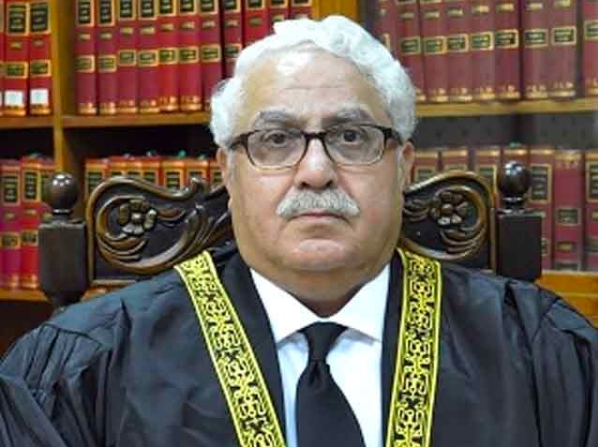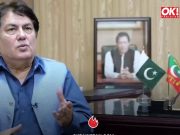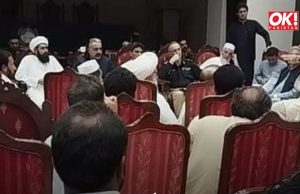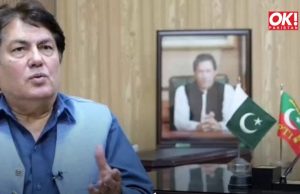On Monday, Justice Sayyed Mazahar Ali Akbar Naqvi asked that his constitutional petitions to challenge the Supreme Judicial Council’s (SJC) misconduct processes against him be set up as soon as possible.

On Justice Naqvi’s orders, the advocate on record (AOR) replied to the notice from the Supreme Court Registrar Office to ask the judge if he wanted to move forward with his case.
The application asked that the subject notice be taken down and that both requests be brought to the committee’s attention so that the right decisions could be made. It also said that the pleas and requests for temporary relief should be given numbers and scheduled to be heard by a bench of this court.
People say that the warning and the order that the registrar is said to have made go against the Supreme Court Rules, 1980 and the Supreme Court (Practice and Procedure Act, 2023) laws. “The Registrar is not allowed to ask a petitioner if they want to move forward with a case or not.” “Therefore, this notice has no legal weight and no jurisdiction,” he said.
In his answer to the assistant registrar (Civil-II), the judge of the highest court asked that the two constitutional cases he had filed be set up to be heard by a three-member bench committee at the same time.
According to his message, “Both constitution petitions raise questions of public importance relating to the enforcement of Fundamental Rights.”
He also said that his applications have not been given numbers yet, which “violates the provisions of the 2023 Act.”
First, the application said that the 2023 Act did not allow “the Committee to delegate to the registrar its authority under Sections 2, 3, and 4.”
Second, it said that the registrar was not allowed by the 2023 Act to decide whether requests were valid under Article 184(3) of the Constitution. Justice Naqvi said that the highest court had always said that a bench of this court, not the registrar, should decide if a case could be kept alive.
“Third, the registrar doesn’t have the power to decide if a constitution petition is about interpreting constitutional rules. According to Sections 3 and 4 of the 2023 Act, this power only belongs to the Committee, Justice Naqvi said.
The letter requested that “without prejudice to the above, even as per the Minutes of the Meeting of the Committee dated 26.10.2023 (reproduced in the subject notice) a constitution petition involving interpretation of constitutional provisions is to be placed before the Committee” .
“This notice, with respect, establishes that the registrar has not only failed to act by the provisions of the 2023 Act but has also failed to comply with the express directions of the Committee by choosing not to place these petitions before the Committee,” the letter stated.
“Proceedings for misconduct without legal authority”
Three days ago, Justice Naqvi asked the highest court again to stop the misconduct processes against him that were started by the SJC, even though he strongly denied all the claims made against him. In his second constitution, Justice Naqvi also asked the court to reject the SJC’s second and amended show cause notice from November 22 as “not legal.”
In a separate letter, the judge asked a three-person committee of the Supreme Court, which was created under the recently passed Supreme Court (Practice and Procedure) Act, 2023, to quickly review his constitutional cases and applications for interim relief. When the judge reminded the committee that the SC act says it has to list petitions made under Article 184(3) within 14 days, the committee did so.
“However, even though these petitions and applications have been filed, the SJC is still going after me, which hurts my constitutional petitions very badly.” “If any order is made [by the SJC] based on the proceedings, it may go against my arguments, which were raised in the constitution petitions,” he says. It was asked by the judge that the case be heard by a bench that does not include the SC judges who are part of the SJC.
The three people on the committee—Chief Justice of Pakistan Qazi Faez Isa, Justice Sardar Tariq Masood, and Justice Ijazul Ahsan—are all part of the five-person SJC that is investigating Justice Naqvi. With a vote of three to two, the SJC gave Justice Naqvi a “show cause” notice on October 21. They did this while they were looking over the ten complaints that were made against the SC judge earlier this year. He had 14 days to send his answer to the board.
On November 10, Justice Naqvi responded to the show cause notice. In it, he accused three SJC members of bias—Justice Isa, Justice Masood, and Balochistan High Court (BHC) Chief Justice Naeem Akhtar Afghan—and asked them to step down. The SJC scheduled a meeting for November 20 to look into the complaints against Justice Naqvi, even though he was against it. The next SJC meeting began on November 20 and went until November 22. At the end of that meeting, the SJC sent the judge an updated second show cause notice.
There was also a constitution case filed by Justice Naqvi with the highest court on November 20 to question the council’s actions. He asked the court to throw out the accusations of misconduct against him because they were “without lawful authority and of no legal effect.” In the motion that was turned in on November 30, the SC judge answered ten claims paragraph by paragraph. The SJC had asked him to explain these claims on November 22.
The word “corruption” was used too much in the revised show cause notice, which Justice strongly disagreed with. He denied all the claims about the listing of cases, the allegedly illegal sale and purchase of properties, and the role of his sons as his go-betweens. “That kind of language toward a judge of the Supreme Court of Pakistan is rude and inappropriate.” More than the petitioner, this kind of wording hurts the Supreme Court of Pakistan’s honor and reputation.




















































